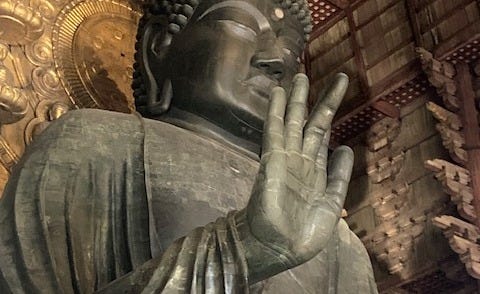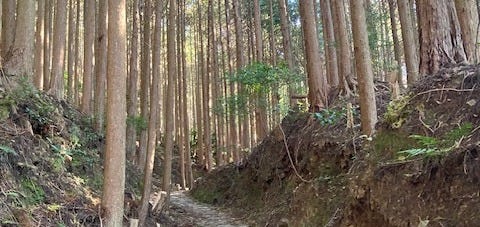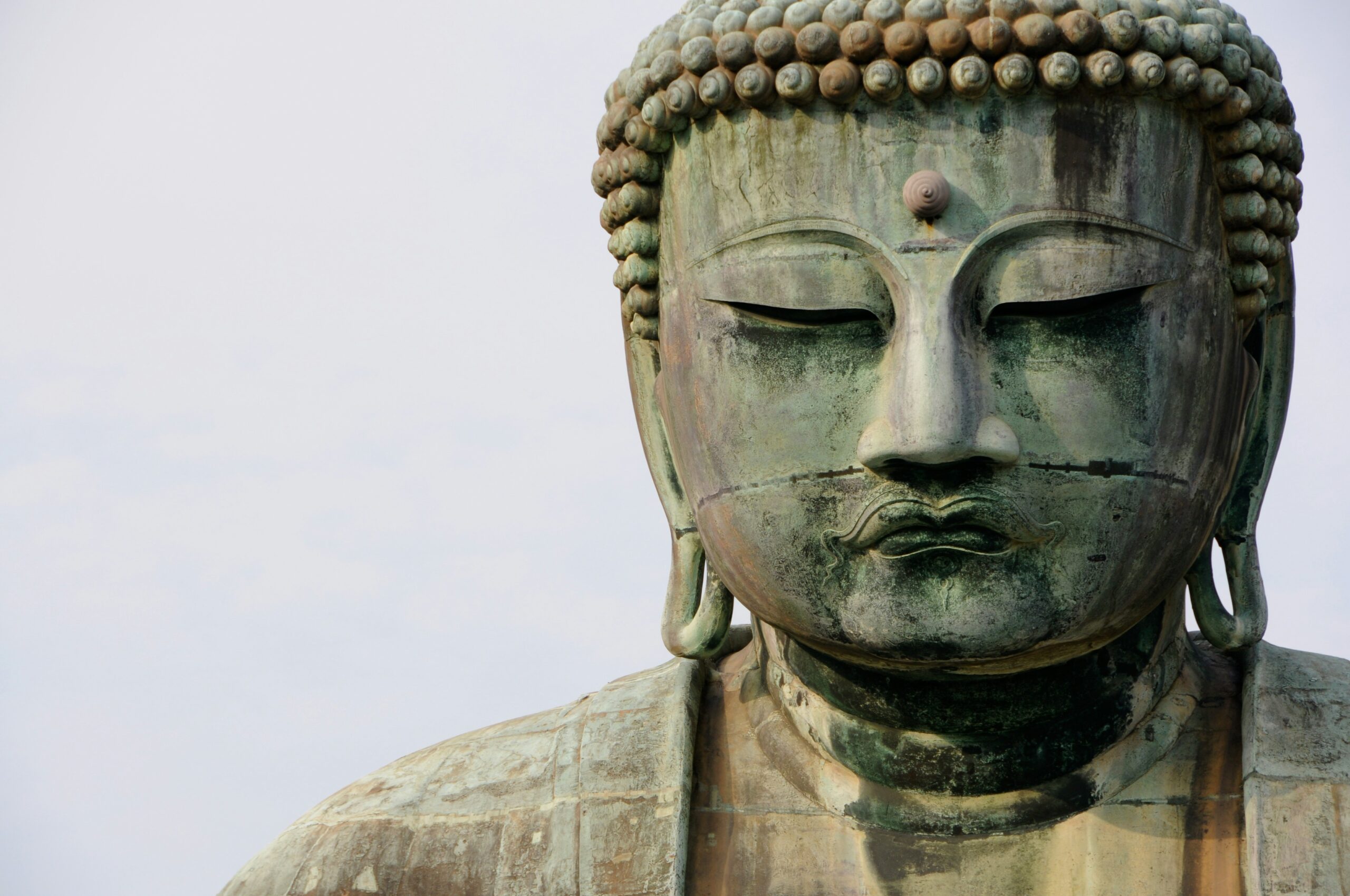- Greetings from Japan
- Insights Into Practices
- What I’m Cooking
- 3-Month Practice Period
- Half-day Retreats
Greetings from Japan. Walking four days of the Kumano Kodo trail was wonderful. It was both more challenging and more spectacularly beautiful than I Imagined. Now, enjoying and appreciating a few days in Nara, a former sacred capital.

(Fifty foot high wooden Buddha at Todai-ji temple in Nara)
I’m generally not a big fan of acronyms. But, I really like SCARF and STER. Probably because they help me remember 1) how we cause ourselves confusion and suffering and 2) practices for waking up, and living with more emotional freedom.
SCARF stands for
Status
Certainty
Autonomy
Relatedness
Fairness
I call SCARF the acronym of suffering. Gains and losses in each of these areas are often not in our control. What is more in our control is how we interpret and respond to increases and decreases in these areas.
Often leaders (and humans in general) welcome or want more status, more certainty, more autonomy, more healthy relationships, more fairness and we don’t want a decrease in any of these. Neuroscience has shown that an increase in each of these areas lights up in the brain as pleasure and a loss or decrease is associated with the pain centers in our brains.
As an example, we might receive an increase in status with a promotion or a more prominent job title. In response to this increase in status, we feel pleasure. A decrease in status such as a demotion or losing a job signals pain. Status can also be about perceived power or being part of a perceived “in-group” vs. an “out-group.”
One reason we suffer is we may never feel we have enough status and status is both very relative and often not in our control. The same is true for certainty, autonomy, relationships, and fairness — We’ll never get enough certainty. We like having more autonomy and more healthy relationships. Very little in this life is fair. Wanting more (or receiving less) of any of these qualities will lead to confusion and pain.
The SCARF model comes from researcher and author David Rock. It was developed in the context of leadership as a tool, or as a set of management practices for bringing more awareness of the power of these extremely prevalent domains. In leadership we often can give or take away these qualities: status, certainty, autonomy, relationships, and fairness. As leaders there is power in how we wield these five elements or qualities.
SCARF can be used as a model for helping leaders (or anyone) understand how actions and decisions might influence others, or be perceived as rewards or punishments. Through this understanding we can more skillfully navigate change and transitions.
STER: The Acronym of Waking Up
STER stands for:
Selflessness
Timelessness
Effortlessness
Richness
I call STER the acronym of freedom or waking up. It describes states that can free us from what we can’t control. It points to a series of practices to reduce desires and transform a mindset of needs and scarcity to one of greater appreciation.
· Selflessness means becoming more aware of your self and going beyond being caught by the idea of yourself. By looking more deeply, loosening your ego needs and doing some perspective taking, you have more flexibility and a broader perspective.
· Timelessness included the practice stepping back and looking at your life from a much wider perspective in terms of time. Explore what it feels like to let go of time, especially during your morning meditation. Take it slower. Enjoy tasting your food; enjoy being with your family and friends, unrushed. Let go of being driven by the clock.
· Effortlessness starts by noticing and bring more awareness to effort and any extra, unneeded effort and letting it go.
· Richness is seeing and appreciating how alive, new and fresh everything is – your breath, body, the clouds. Look into the eyes of your family member. It is a practice of cultivating more appreciation.
Practice
Notice your own relationship with SCARF: status, certainty, autonomy, relationships, fairness. Bring more awareness to one of these areas. Status is particularly interesting to bring more awareness to.
Practice with STER: selflessness, timelessness, effortlessness, and richness. Play with effort and effortlessness. Practice seeing everything as rich, new, and alive (like everything actually is…)

(Kumano Kodo Trail in Japan)
What I’m Cooking: Polenta Casserole
This is an easy and flexible dish, and one of my favorite special dinners to make. It takes a some time, waiting time for the polenta to set — how good to slow down. An alternative is to serve soft, hot polenta with vegetables.
Polenta: Put 1 cup of organic polenta into a saucepan with 3.5 cups of water. Bring to a boil, stirring with a wooden spoon or whisk for 10 minutes. Add a bit of salt. You might add a half cup of cheese, cheddar or gouda, or go wild and try gruyere. (If it is too thick, add some water; if too thin, add a bit more polenta.) Pour into a 8” x 10” baking dish . Let it cool for 15 or 20 minutes and then refrigerate until it sets enough to cut.
Vegetables: 1 onion, small chop, and a few cloves of garlic. Sautee for 10 minutes or so. Add 5 – 8 sliced medium mushrooms and 2 sliced zucchinis. Add a couple of fresh tomatoes or 1 can of fire roasted diced tomatoes. Season with salt and pepper. Maybe 1 chopped serrano salt, pepper, and perhaps some fresh basil
Once the polenta has set, cut into 1 inch squares. Oil a casserole and line the bottom with polenta squares. Put half of the vegetables on top of the polenta, another row of polenta and top with vegetables. One options is to add some cheese to the middle layer and on top.
Cook at 400 for 45 minutes and serve.
Appreciating Your Life: A 3-Month Zen Practice Period
January 8th – April 2nd, 2025
Online
A 3-month Practice Period is a great way to begin or deepen your mindfulness and meditation practice and cultivate ways for integrating mindfulness practice with your work and all parts of your life.
Online meetings are Wednesday from 6:00 – 7:30 p.m. PT. We will begin each session with 30 minutes of lightly guided meditation, followed by a short talk, as well as small group and large group discussions.
The theme for the Practice Period is Appreciating Your Life. This is the underlying theme of meditation practice and Zen practice – seeing and feeling everything, the good, bad, ugly, beautiful – as gift and an opportunity to learn, grow, and engage. It’s the practice of feeling deeply, opening our hearts and minds, with a mindset of appreciation, and of being of benefit, through our ability to see more clearly, to accept what is, and work effectively with change and for change.
Our focus will be on how Zen practice can be integrated into daily life to help us:
– cultivate greater wellbeing
– navigate change and challenges
– discover more meaning and purpose in work and relationship
Our primary reading for the practice period is Branching Streams Flow In The Darkness, Zen Talks on a poem called the Sandokai, or the Harmony of Difference and Equality. This is an excellent primer on the non-dual teaching is Zen practice and how to apply them to your wellbeing, relationships, work, and social and environmental responsibility.
Being part of a community that meets weekly is a powerful way to find more clarity and connection as we begin a New Year. Each week we will meditate together for 30 minutes. Then, I’ll give a short talk, unpacking ideas and practices from Branch Stream Flow In The Darkness. We will have a variety of small group and large group discussions, to practice and deepen the tools and themes discussed. Each week you will leave with an actionable insight, or a practice, and a suggested reading.
Weekly sessions will be recorded and made available in case you miss any sessions or want to revisit them.
I hope you will join me.
Half Day Retreats
December 8th, In Person and Online, in Mill Valley
January 26th, 2025, In Person and Online, in Mill Valley.
In our world of busyness, of more/faster/better, this half-day retreat offers time to stop, reflect, and renew. We will explore the practices of effort and effortless as a path to well-being and “stepping into your life.” Together we’ll follow a gentle schedule of sitting and walking meditation, a talk, and some discussion.
Anyone looking to begin or deepen a meditation and mindfulness practice is invited to attend. What is meditation? I like a definition proposed by Dogen, the 13th century founder of Zen in Japan: “The practice I speak of is not meditation. It is simply the dharma gate of repose and bliss…It is the manifestation of ultimate reality…Once its heart is grasped, you are like a dragon when he gains the water, like a tiger when she enters the mountains.”
Warm regards
Marc

